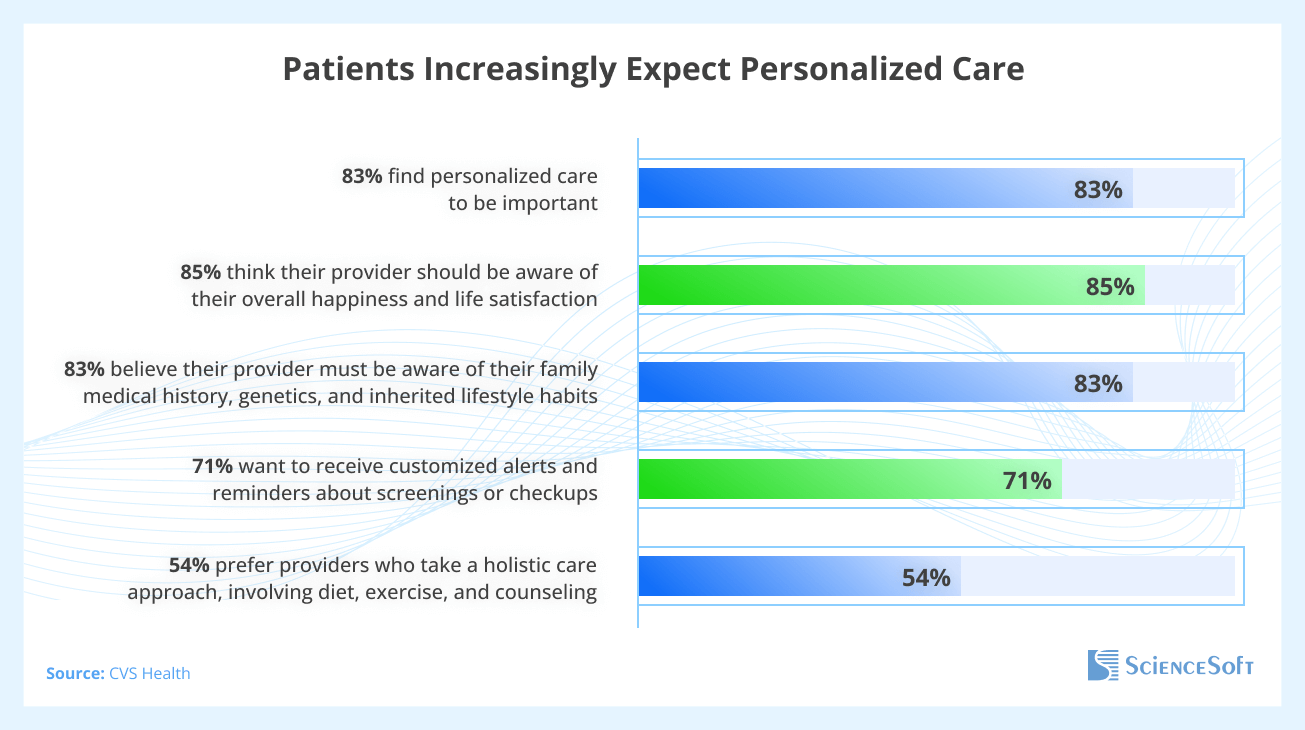Personalization in Healthcare: What It Is, Why It Matters, and How Technology Can Help To Implement It
Personalization in healthcare refers to adapting patient care to each individual's needs, based on a range of patient-specific factors, including demographics, medical history, genetic makeup, social determinants of health, behavior, personal preferences, and lifestyle.
Personalization in healthcare is, first and foremost, a mindset — one focused on understanding each patient’s unique characteristics and circumstances in order to tailor patient communication, diagnostics, and care delivery accordingly. However, due to limited time and resources in clinical settings, it’s rarely delivered through human efforts alone and thus heavily relies on the use of technology.
Healthcare personalization can take many forms, from applying big data analytics for enabling precision medicine (e.g., choosing the most effective treatment based on a patient’s genetic profile), to using patient-facing applications to enable patient-centered care (e.g., by engaging patients in the shared creation of personalized care plans, sending personalized appointment reminders, and sharing tailored educational content via patient apps).
Ideally, care personalization should be provided on both the doctor’s and the patient's side. For example, physicians can use AI suggestions to create personalized health plans, while patients can navigate their rehabilitation process with the help of virtual assistants.
Why Healthcare Personalization Matters
Patient personalization is becoming a basic expectation of patients and one of the major factors they consider when choosing a healthcare provider. A survey of 3,500 participants found that 70% of people want healthcare systems to take a more proactive role in helping them manage their health. In another survey, which involved interviewing 1,000 respondents, 60% stated they would choose a provider based on how well the provider understands them beyond basic patient data, so that the experience is relevant and personalized.

Personalized patient care can be a major growth driver for health organizations, but its benefits go beyond that, as it is also an important patient retention mechanism. And retention matters just as much as patient acquisition, as patients have limited tolerance for poor experiences — 86% of patients in a survey reported they would only give a provider up to two chances after a poor interaction. Listening to what patients are saying and responding in a personalized way is key to building nurturing long-term relationships.
So, what specific benefits can organizations gain by implementing personalized healthcare solutions? All the benefits can be divided into three groups: improved health outcomes, enhanced patient experience, and financial gains.
Health outcomes
- Reduced hospital stays and readmissions: Healthcare providers who implement care personalization strategies can see a significant reduction in the length of hospital stays and 30-day readmission rates in just 6 to 12 months (BCG).
- Effective chronic disease management: According to research by OECD, for conditions such as diabetes or cardiovascular disease, personalization in healthcare is key to effective disease management. Chronic disease management requires tailored patient education, lifestyle management, regular disease monitoring and control, support for self-management, and identification of complications.
- Improved treatment adherence: Patients may be more likely to follow their prescribed therapies when the treatment is personalized, for instance, when the genetic risk for a particular condition is factored in. The Personalized Medicine Coalition found out that individuals with a genetic diagnosis maintain a treatment adherence rate of over 86% after two years, compared to just 38% before receiving genetic test results.
- Enhanced diagnostic accuracy and effective treatment matching: Tailoring diagnostics and treatments to each patient’s unique characteristics can significantly improve health outcomes. For instance, many patients don’t respond to the first drug they’re prescribed due to genetic variations affecting how drugs are processed in their bodies. Personalized medicine utilizes genetic and molecular tests to match patients with the most effective treatment from the outset. Breast cancer tests like Oncotype DX® and MammaPrint® help determine which patients need aggressive treatment and which can avoid chemotherapy altogether.
Patient experience and engagement
- Increased patient trust and greater brand value: Some healthcare organizations that implement healthcare personalization reported achieving a 33% increase in trust, 15% higher website views, and 5% less churn (Deloitte). A patient who recommends a care provider to their family and friends can drive much more value than just one patient’s spending.
Financial gains
- Reduced healthcare costs: Some health systems reported having reduced expenses by up to 23% through personalized care strategies.
- Improved financial performance: Hospitals that offer superior patient experiences see up to 50% higher financial performance compared to average providers (Accenture).
Examples of Healthcare Personalization
Solutions for healthcare personalization transform every stage of the patient experience — from choosing a care provider to recovering after treatment — by using data-driven insights to deliver relevant, timely, and patient-specific care.
Below, ScienceSoft consultants outline the examples of solutions that enable healthcare personalization. All of them are organized according to the different stages of the patient journey.
First contact
- Personalized websites and mobile apps can adapt content based on a patient’s location, browsing or in-app behavior, search history, and referral source. Apps and websites can provide information on nearby clinics, recommend relevant medical services, and suggest available appointment slots.
Prevention and early risk detection
- Predictive analytics processes data from various sources (e.g., medical history, data captured by wearables) to identify early signs of potential health issues (e.g., heart disease, diabetes) and other patient-related risks (e.g., fall risks for patients in long-term care settings).
- Targeted preventive care campaigns can help to identify individuals who may benefit from specific preventive services (e.g., screenings, vaccinations) and send them personalized messages with recommended services.
Patient engagement
- Patient engagement solutions enable patients to actively participate in their care by accessing their medical records, communicating directly with healthcare providers, and scheduling their appointments.
- Personalized educational materials help patients better understand their diagnosis, treatment options, and care plans, encouraging informed and confident participation in their health journey.
- Personalized intelligent reminders can support treatment adherence by prompting patients to take medications, attend follow-up appointments, or complete medical procedures. For example, a diabetic mother might get a blood test reminder timed with her baby’s pediatric visit.
- Personal AI assistants can answer patients’ questions, guide them through care steps, and assist with tasks such as scheduling or medication management.
- Patient sentiment analytics interprets a patient’s language and tone to gauge a patient’s emotional state (e.g., to identify signs of distress, satisfaction, or confusion). This data guides physicians on how to communicate with patients in a more empathetic, supportive, and engaging way. It can also be used by personal AI assistants to adjust their communication strategies.
Diagnostics, personalized treatment, and patient monitoring
- Diagnostic support: diagnostic AI applications assist clinicians by analyzing medical images, lab results, vital signs captured by medical devices, and patient-reported symptoms to support faster and more accurate diagnoses.
- Personalized treatment plans: AI analyzes patient data consolidated in EHR and other systems—demographics, medical images, a genetic profile, vital signs, medical history—to generate customized care plans or recommend adjustments to the treatment or rehabilitation programs created by clinicians.
- AI-powered medication management systems can consider factors like a patient’s allergies, chronic conditions, and current prescriptions to recommend the safest and most effective medications. They can also monitor treatment outcomes and suggest adjustments to dosage or drug type, improving therapeutic results.
- Smart medical devices (e.g., glucose monitors, heart rate trackers) provide real-time patient data for remote patient monitoring. Powered by AI and other technologies, they enable clinicians to track treatment effectiveness, make timely adjustments, and receive alerts when early signs of complications are detected.
Post-discharge care
- Smart discharge planning solutions and accompanying patient apps speed up the recovery by providing patients with personalized discharge instructions, symptom monitoring tools, medication reminders, and instant messaging with their primary care physician.
Technologies and Software That Empower Healthcare Personalization
When human-delivered personalization is not always available due to staffing gaps, digital technology can help guide patients toward personalized experiences and better health outcomes. Many technologies enable personalization in healthcare, including:
- AI & Machine Learning analyze vast amounts of disparate patient data to guide diagnosis, medication, and treatment.
- Natural Language Processing (NLP) gauges patient sentiment to improve communication tone and content.
- Wearables & IoT solutions enable continuous health, location, and behaviour monitoring and send real-time alerts to caregivers when issues arise.
- Cloud computing & data repositories enable scalable storage and processing of massive amounts of patient health information.
The key solutions that facilitate data collection, analysis, and personalized communication include:
- Electronic Health Records (EHRs) centralize patient data for real-time access and enable integration with AI tools for treatment recommendations.
- Patient portals and mobile apps engage patients by providing access to personal health records, test results, appointment scheduling tools, and customized health and wellness education.
- Customer Relationship Management (CRM) systems help healthcare organizations manage patient interactions, segment audiences, and personalize outreach based on preferences and behavior. They automate targeted communication and follow-ups based on patient journey data.
- Telehealth platforms facilitate remote consultations, often supported by integrated analytics and symptom checkers.
Looking Ahead
As patients take a more active role in their health, they expect personalized care that matches their personal medical history, goals, and preferences. For healthcare providers, meeting these expectations is crucial, not just to improve health outcomes but to stay competitive. With the right data, tools, and strategy, healthcare personalization can improve every step of a patient's journey — from prevention and diagnosis to recovery and long-term care.

